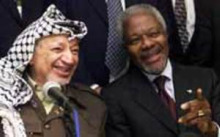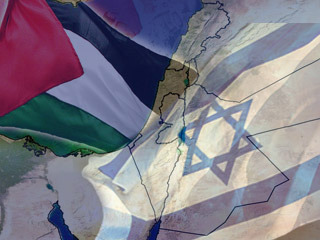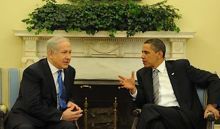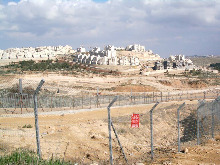Matt Rees's Blog - Posts Tagged "settlements"
Beastly Me: What Israel learned from Arafat
Tomorrow's Netanyahu-Obama summit has Iran, Gaza, and settlements on the agenda, but the Israeli leader will bring a new tactic learned from an old nemesis. On The Daily Beast today, my take on how Bibi will "pull an Arafat."
Global Post: Bibi in a corner
Obama presses Israeli Prime Minister Netanyahu to stop building in West Bank settlements. By Matt Beynon Rees - GlobalPost May 26, 2009
JERUSALEM — One morning late last week, Israeli Border Police showed up at Maoz Esther, an outpost of Israeli settlers in the West Bank near Ramallah. They waited for a Bible study class to finish, tore down the settlers’ five little shacks and ran the residents off.
A few hours later, the settlers returned, nailing together the battered pieces of drywall shunted aside by the government. Maoz Esther rose again.
This kind of half-hearted approach to clearing out illegal outposts is the way Israel has always handled the settlers. Read more...
JERUSALEM — One morning late last week, Israeli Border Police showed up at Maoz Esther, an outpost of Israeli settlers in the West Bank near Ramallah. They waited for a Bible study class to finish, tore down the settlers’ five little shacks and ran the residents off.
A few hours later, the settlers returned, nailing together the battered pieces of drywall shunted aside by the government. Maoz Esther rose again.
This kind of half-hearted approach to clearing out illegal outposts is the way Israel has always handled the settlers. Read more...
Writer is pro-Palestinian and pro-Israeli
 The best thing about moving from journalism to fiction writing is that people show you more respect.
The best thing about moving from journalism to fiction writing is that people show you more respect.As a journalist covering a troubling issue like the Israel-Palestinian conflict, I was often subject to rather nasty verbal attacks during public speaking engagements. For a partisan of either side, I seemed a fine target for their generalized contempt—they thought journalists were all against them and here was a live reporter on whom they could vent their spleen.
Thankfully that doesn’t happen now that I’m the author of a series of Palestinian crime novels. I wasn’t sure that it would be different, but it turns out that there’s a big change in the way people behave toward me.
Here are two examples from the last week alone.
In Cologne, Germany, last week, I talked in a bookstore at the invitation of the Cologne-Bethlehem Association. Much of the audience was made up of middle-aged and older Germans who visit Bethlehem frequently and have made strong ties with the people there.
One older gentleman suggested that, because my first novel THE COLLABORATOR OF BETHLEHEM shows the corruption and extortion carried out by the gunmen of the town during the intifada, my book “tended toward Israeli propaganda.”
But the old fellow was very respectful and as I answered him I could tell he was listening. (My response, of course, is along the lines of “No, actually the book doesn’t even address whether or not it’s right to shoot at Israelis; the book concerns itself with the negative effect those gunmen had WITHIN Palestinian society.”) Listening’s something that was often evidently not happening when, as a journalist, I would talk to audiences.
Then this week I went to the Israeli settlement of Efrat in the West Bank. I’ve visited many times before to write news reports about the confiscation of land or the endless pressure from Washington to stop building in the settlements. This time I was invited by the Gush Etzion Book Group, a few dozen women who live in the local settlements.
There had been quite some fiery debate within the group about whether to have me come and speak to them. Indeed, someone hinted that certain members of the group had stayed away.
Nonetheless, I was glad to be there. After all, much of THE COLLABORATOR OF BETHLEHEM takes place in the village of Artas and the Dehaisha Refugee Camp, which abut the northern reaches of Efrat. I want very much to talk about my books with people who have a stake in the Israeli-Palestinian struggle. Provided they’re willing to listen respectfully, to examine what I’m actually saying and not what they think I’m saying (or what they wish I’d say.)
The evening in Efrat went well and, in fact, much of what we talked about was how little I’m interested in politics—despite the apparently political subject-matter of my novels. What interests me is “the life that remains when politics is sluiced away like the filth a stray dog leaves in the street” (that’s a line from my sleuth Omar Yussef in THE FOURTH ASSASSIN, the next of my novels, which will be published Feb. 1).
Such respectful treatment is a big contrast to situations I encountered as a journalist. Then I would look out over audiences which seemed to be entirely red-faced and with arms crossed over every chest. The hostlie body language didn’t change, even though I was essentially saying the same things I’m saying now. Partisans hate journalists and, I believe, many of them used somehow to detest that I had found a kind of personal peace in covering the very conflict that stirs them up and stresses them so.
In Cologne and Efrat, people heard what I had to say and understood that I’m pro-Palestinian and pro-Israeli. I'd like all the people I know here to have a good life, not the violent situation they suffer. Politics makes people choose sides, and I want no part of that.
I also think choosing sides makes for rather bad novels. It’s in the shades of gray, where decisions are so difficult or even impossible to make, that a novel becomes truly compelling--think of Graham Greene’s best novels. Political journalism on the other hand is, to say the least, dreary. Think of the glib rubbish turned out by columnists who have to fill three op-ed spaces each week.
Who would you respect more—Graham Greene or G. Gordon Liddy? See what I mean?
So I’ll continue to talk about my books to anyone who’ll take the time to read them, because that in itself is a sign of respect and openness. Those, after all, are the qualities most needed by both sides of the Israeli-Palestinian conflict if they’re ever to find peace.
(I posted this first on a joint blog I write with some other international crime writers.)
Published on January 14, 2010 23:21
•
Tags:
bethlehem, book-groups, cologne, crime-fiction, efrat, fiction, g-gordon-liddy, graham-greene, gush-etzion, international-crime-authors-blog, israel, israelis, journalism, koeln, matt-beynon-rees, mystery-novels, omar-yussef, palestine, palestinians, politics, settlements, settlers, the-collaborator-of-bethlehem, the-fourth-assassin, west-bank
Israeli settler sect: Messiah is coming
 GIVAT ONAN, West Bank—On this windblown outpost in the hills north of Jerusalem, a small group of Israeli settlers strives to bring the day of redemption promised, as they believe, in the Bible.
GIVAT ONAN, West Bank—On this windblown outpost in the hills north of Jerusalem, a small group of Israeli settlers strives to bring the day of redemption promised, as they believe, in the Bible.A controversial sect shunned by nearby Israeli settlements, the Brothers of Onan believe that by “spilling their seed” on the land of the ancient biblical Jewish homeland, they will hasten the coming of the Messiah. With the Israeli communities of the West Bank considered illegal under international law, the Onanists are the outcasts among outcasts. But they’re unperturbed.
“We can never give up this land,” says the group’s leader, Rabbi Meir Gedalia Kaplowitz. “You can ejaculate all you want in Tel Aviv or New York, but the Holy One, blessed be He, wants us to perform the miracle here.”
Kaplowitz sits in a messy caravan on a windy hilltop, taking a brief break from his endless routine of Talmud study and self-abuse. Wild-eyed and gaunt, he is the picture of the stereotypical Israeli settler extremist. Only, if anything, even more wild-eyed and gaunt.
The sect takes its name from the biblical Onan, who was ordered by his father Judah to impregnate Tamar, his brother’s widow, and to pass off the resulting children as belonging to his deceased brother. Not wanting to have children he couldn’t regard as his own, Onan fornicated with Tamar but at the moment of ejaculation he “spilled his seed.” God punished this disobedience by killing Onan.
Onanism has become a term used to describe such coitus interruptus, though it is also used for masturbation. In the Hebrew spoken on Givat Onan, masturbation is “onanut.”
“We’re proud to use that word for what we do,” says Haim Hercz, who occupies the caravan next to Kaplowicz. “But it's not all about Onan. Sometimes we call it flogging the Pharisee or chafing the camel. We have a sense of humor, just like people who have sex with women. But anyone can do that five or six times a day. We know that what we’re doing has a deeper purpose, and that’s what keeps us going.”
The Brothers of Onan celebrated Passover with a traditional Orthodox seder meal this week. (“Frankly it was nice to have something else to keep us occupied for six hours,” says Hercz.) But next week they plan to take their struggle to Tel Aviv, where they will pray and “shoot their short Uzis” outside the Israeli Defense Ministry to protest any restrictions on building in the settlements.
Successive Israeli governments have justified new construction in the West Bank by arguing that they are only satisfying “natural growth,” whereby the growing families of settlers must be accommodated with new homes. “Obviously that’s not fair on us,” says Kaplowitz.
Israelis who oppose the settlements say the Brothers of Onan are more than a dangerous fringe group. Orla Mohel, a Tel Aviv masseuse, founded Wank Watch to combat the influence of the group. “I’m concerned that a lot of people in Tel Aviv will see them as harmless ‘frotteurs,’” she says. “But they celebrate a story from Genesis in which a father forces a brother to have sex with his sister-in-law, tries to get a third son to marry her, then has sex with her himself.”
Harvard Law School professor Alan Dershowitz writes in his book “The Genesis of Justice” that Onan probably had non-penetrative sex with Tamar, or maybe anal sex.
“I didn’t go to Harvard and I’m not a lawyer, so I'm no expert on the Bible or anal sex,” responds Mohel. “But these Onanists also don’t want to give up the West Bank, which prevents a peace deal.”
Rabbi Kaplowitz contends that he’s no extremist. Rather he claims to represent the mainstream in Israel. “There are only a couple of dozen of us here, but there are thousands of others who’d like to join us. We’re out here in the lonely desert hills, doing something important for the redemption of the world. It’s not easy. We have very slow internet and sometimes youporn.com goes down for minutes at a time. Our thing is exhausting without visual aids.”
US Mideast envoy George Mitchell has condemned the Givat Onan outpost as “illegal under international law and pretty skeezy.” Mitchell also cited the 4th Century sage St. Athanasius of Paros as saying that “to have coitus other than to procreate is to do injury to nature.”
Kaplowitz rejected the criticism. “I don’t take sex advice from Greeks,” he said.
Published on March 31, 2010 23:59
•
Tags:
alan-dershowitz, april-fools, bible, book-of-genesis, george-mitchell, givat-onan, israel, judah, new-york, onan, onanism, peace-talks, self-abuse, settlements, talmud, tamar, tel-aviv, the-genesis-of-justice, west-bank
The war Israelis and Palestinians plan
 I posted this on Global Post. JERUSALEM — There’s an old Arab aphorism: “A man with a plan takes action; a man with two plans gets confused.” Apply that to the Israelis and to the Palestinians, and the nonsensical sequence of recent events in the Middle East starts to fall into a comprehensible pattern.
I posted this on Global Post. JERUSALEM — There’s an old Arab aphorism: “A man with a plan takes action; a man with two plans gets confused.” Apply that to the Israelis and to the Palestinians, and the nonsensical sequence of recent events in the Middle East starts to fall into a comprehensible pattern.It’s not a pleasant pattern, because it leads to war.
First, before we get to the fireworks, let’s recap all the nonsense.
The Palestinians refused to talk to the Israelis from December 2008, when a relatively centrist Israeli government made a peace offer the Palestinians rejected. Since then, small economic reforms and big U.S. security aid have made life in the West Bank fairly free of violence. Better, for sure, than life in Gaza, which is still a mess more than a year after the Hamas-Israel war there.
Israelis elected a center-right-dominated parliament a year ago, and Benjamin Netanyahu formed a rightist cabinet. He refused to halt building in Israel’s West Bank settlements, as President Barack Obama demanded. Even when forced by Washington to put a transparently fake freeze on construction he declined to include East Jerusalem.
The Palestinians wouldn’t restart direct peace talks until there was a freeze on the Israeli neighborhoods of East Jerusalem. So the Americans eventually persuaded them to have indirect talks. Without much enthusiasm, the Palestinians agreed.
Why no enthusiasm? Leading Palestinians, including chief negotiator Saeb Erekat, had already started to talk about a new failed round of talks leading quite simply to a “one-state solution.” That means, no division of the land, just a single state in what’s now Israel, the West Bank and Gaza. One adult, one vote. Soon enough, of course, that means no Jewish majority and the end of Israel as a Jewish state.
Meanwhile, Israel largely escaped the financial crisis of the last two years and its citizens spend little time fretting about the Palestinians. In Tel Aviv, the discovery of old bones by workers building an underground emergency room for a hospital led last month to an attempt by ultra-religious politicians to block the construction, and protests by locals who cried out against religious coercion.
No such mass protests against continued building in the settlements. That proceeds, even to the extent that during the last month announcements of new construction in East Jerusalem have caused a major crisis in relations with Washington. In one case, the planned building of a mere 20 apartments in an Arab neighborhood of East Jerusalem forced Obama to take time out of his undoubtedly busy day to discuss it with Netanyahu.
There’s more nonsense, but let this much suffice for now.
Back to the Arab aphorism. Who has a plan, and who’s confused?
It’s clear that most Israelis and most Palestinians are living in denial — a kind of confusion, because it takes the illusion of current calm for a sustainable and welcome period of peace.
Israelis know the settlements can’t go alongside a two-state solution, but they don’t choose one or the other.
Palestinians know that the way to stop the settlements eating up the hilltops around their towns is to strike a deal now and rule their own state, but they won’t do it so long as life is relatively good and the international pressure is all on Israel. Leaders of Fatah and Hamas have called for a “third intifada” several times in the last four months — not for renewed talks, only for renewed violence. But a mere handful of kids came out to throw rocks and Molotov cocktails.
With no sense of urgency on either side, Western diplomats shake their heads and try to nudge the two nations to the negotiating table. It’s time to realize that neither side wants talks.
While most Israelis live in denial, a sizeable minority pushes for more building in the West Bank and East Jerusalem. They’re not building so that they can later give up that land and see all the money they’ve pumped into their real estate wasted. The purpose is to make the West Bank inseparable from Israel. To kill the two-state solution.
In that scenario, either the Palestinians agree to be second-class inhabitants of the area -- fat chance -- or they leave. Well, with a little nudge.
On the Palestinian side, negotiations seem unlikely to lead to the satisfaction of every single demand. So the one-state solution starts to look good to them, too. However, second-class citizenship isn’t an option, and neither is leaving.
That’s the collision course Western diplomats refuse to countenance. When envoys talk about getting the “peace process on track,” it sounds good. But that process has been trucking along since the early 1990s. Peace has been getting further away. The “process” allows for a sense of activity, while all the time events — settlement construction, terror attacks — make it harder to draw lines on a map and make the populations secure.
It’s time to figure out a new diplomatic strategy to deal with the Israelis and Palestinians. One that’s based on the assumption that, in the longterm, they’re expecting war.
Published on April 06, 2010 02:02
•
Tags:
arab, barack-obama, benjamin-netanyahu, conflict, crime-fiction, east-jerusalem, fatah, gaza, global-post, hamas, intifada, islam, israel, israelis, jerusalem, jews, journalism, middle-east, palestine, palestinians, settlements, tel-aviv, war
All talk, no two states

At his White House press conference with Israeli Prime Minister Benjamin Netanyahu this week, United States President Barack Obama enthused that the talks about talks will probably lead to talks, and his assessment was that the Israeli government is ready to take part in those talks.
As the camera shutters clicked and the Israeli prime minister cocked his eyebrow in the way he favors when trying to look smarter than everyone else in the room, the most powerful man in the room said: “We expect proximity talks to lead to direct talks, and I believe that the government of Israel is prepared to engage in such direct talks.”
If that sounds like a lot of nothing, that’s because underlying all the talking about talks there’s a growing sense that none of it will ever lead anywhere. Anywhere good that is. The talks are supposed to be about what’s known as the “two-state solution,” in which the land of Israel, the West Bank and Gaza is divided into a state for Israel and a state for the Palestinians.
More and more Israelis and Palestinians, however, acknowledge (or fear) that it’s too late to effectively divide the land as the Israeli and Palestinian populations grow and merge geographically. All the talking about talks and the climate of fear in both nations’ polities delays the chance of a final deal. That, in turn, allows changes on the ground to make a two-state solution still further away.
“The two-state solution is really not an option anymore,” said Gideon Levy, a columnist for the Israeli newspaper Ha’aretz and author of a new book of essays about the Palestinians called “The Punishment of Gaza.”
“It’s on its last legs,” he said.
Read the rest of this post on my blog The Man of Twists and Turns.
Published on July 09, 2010 06:40
•
Tags:
barack-obama, benjamin-netanyahu, gaza, gideon-levy, hamas, hebrew-university, israel, jews, mahmoud-abbas, palestinians, peace-talks, sergio-della-pergola, settlements, two-state-solution, united-states, west-bank
Israeli settlements: frozen, still cooking
 JERUSALEM — Palestinian negotiators said again this week they’d refuse to re-enter direct peace talks with Israel unless the current partial freeze on construction in Israeli settlements is extended when its term runs out in September.
JERUSALEM — Palestinian negotiators said again this week they’d refuse to re-enter direct peace talks with Israel unless the current partial freeze on construction in Israeli settlements is extended when its term runs out in September.But as a report released this week by the Israeli human-rights organization B’Tselem reveals, a real settlement freeze would have to be a very, very big chill.
B’Tselem’s report, called “By Hook or By Crook: Israeli Settlement Policy in the West Bank,” documents the massive scope of Israel’s settlement operation. It says that hundreds of millions of dollars are being paid to settlers, real estate developers and settlement municipalities as incentives to expand the settlements. It also highlights the manner in which every layer of Israeli bureaucracy continues to be involved in an expansion project that successive Israeli governments have pledged in international forums to halt.
For the human rights group, the issue is not political. Jessica Montell, B’Tselem’s executive director, said that the inequality of life in the West Bank — rather good if you’re an Israeli and pretty bad if you’re Palestinian — is the most objectionable upshot of the settlements, which she adds are illegal under international law.
“In the West Bank, your rights are based on your nationality,” she said.
Read the rest of this post on my blog The Man of Twists and Turns.
Published on July 23, 2010 22:03
•
Tags:
b-tselem, benjamin-netanyahu, east-jerusalem, george-w-bush, human-rights, israel, israeli, jessica-montell, middle-east, palestine, palestinian, road-map, settlement-freeze, settlements, tel-aviv, west-bank



